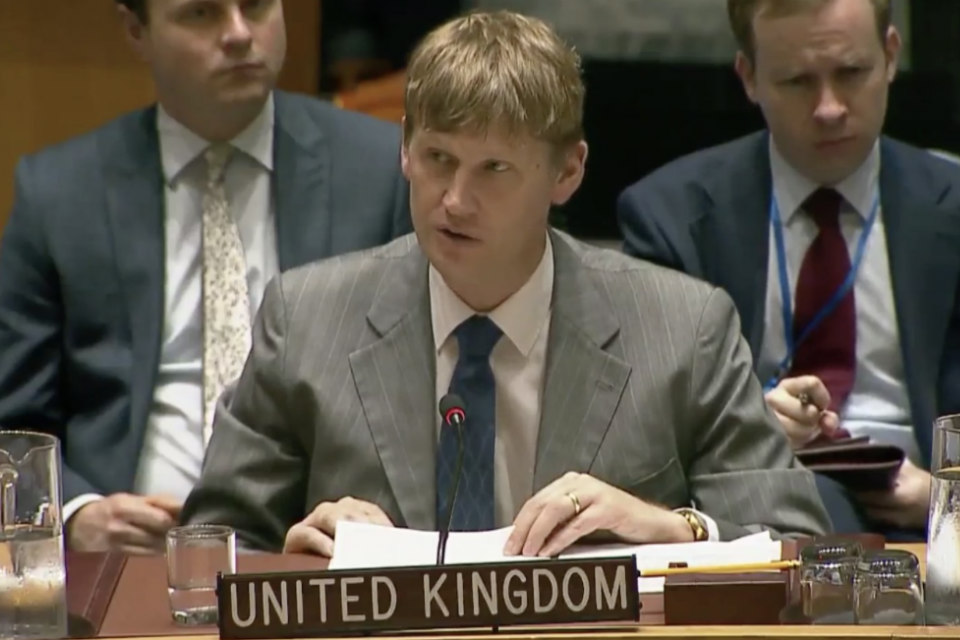"We believe the way to achieve lasting peace is through a negotiated two-state solution"
Statement on the Middle East and Iran by Ambassador Jonathan Allen, UK Deputy Permanent Representative to the UN, at the Security Council.

Thank you Mr President and may I also thank Assistant Secretery-General Jenča, and through him, Special Coordinator Mladenov, for all of his work.
From the outset, I would like to make clear, as we approach the centenary of the Balfour Declaration next month, that the UK understands and respects the sensitivities many have about the Declaration and the events that have taken place in the region since 1917.
The UK is proud to have played a role in helping to make a Jewish homeland a reality. And we continue to support the principle of such a homeland and the modern state of Israel.
Just as we fully support the modern state of Israel as a Jewish homeland, we also fully support the objective of a viable and sovereign Palestinian state. The occupation is a continued impediment to securing the political rights of the non-Jewish communities in Palestine. And let us remember, there are two halves of Balfour, the second half of which has not been fulfilled. There is therefore unfinished business.
With the approaching centenary, we believe it is important to look forward, not backward: forward towards establishing security and justice for both Israelis and Palestinians through a lasting peace.
We believe the way to achieve this lasting peace is through a negotiated two-state solution that leads to a safe and secure Israel living alongside a viable and sovereign Palestinian state, based on 1967 borders with agreed land swaps, Jerusalem as the shared capital of both states, and a just, fair, agreed and realistic settlement for refugees.
Mr President, we continue to watch developments on intra-Palestinian reconciliation closely. Our longstanding policy on reconciliation is that we support the Palestinian people in realising self-determination through an independent, sovereign, and unified Palestinian state encompassing the West Bank and Gaza.
We continue to closely monitor the situation in Gaza, and welcome Egyptian efforts on this important issue. We also join the Secretary-General in welcoming the Palestinian Authority’s return to Gaza on 2 October, and the agreement to allow the Palestinian Authority to resume administrative control. This is an important and positive step toward the full restoration of Palestinian Authority control and effective governance in Gaza. We encourage those involved in the talks to engage in good faith, to allow the Palestinian Authority to fully resume its government functions, and ensure compliance with the Quartet Principles.
Our policy on Hamas remains clear: Hamas must renounce violence, recognise Israel and accept previous agreements. We expect now to see credible movement towards these conditions, which remain the benchmark against which its intentions should be judged. We call on those in the region with influence over Hamas to encourage Hamas to take these steps.
Mr President, in support of the two-state solution, we must continue to press the parties on the need to refrain from actions which make peace efforts more difficult. We are clear that the repellent phenomena of terrorism and incitement pose a grave threat to the two-state solution, and must end.
We strongly condemn the use of racist, hateful and anti-Semitic language. It is right that we continue to urge against any type of action and language that makes it more difficult to achieve a culture of peaceful coexistence.
Settlement construction is a significant barrier to achieving the negotiated agreement we seek, and seriously threatens the physical viability of the two-state solution.
We have witnessed an unacceptable acceleration of settlement activity throughout 2017, both in the West Bank and East Jerusalem. To date, Israel has advanced plans for over thirteen thousand settlement units - the highest number of units since 1992. Reports also indicate that a significant number of units may be advanced this week, and new settlement construction permits were approved in Hebron for the first time in fifteen years. We condemn each of these illegal acts in the strongest terms.
Mr President, moving briefly to Iran:
As we have heard, President Trump has taken the decision not to recertify Iran’s compliance with the Joint Comprehensive Plan of Action to Congress. The UK stands committed to the JCPoA and its full implementation by all sides. We believe that preserving the JCPoA is in our shared national security interest. The nuclear deal was the culmination of 13 years of diplomacy and was a major step towards ensuring that Iran’s nuclear programme is not diverted for military purposes. The JCPoA was unanimously endorsed by this Council in Resolution 2231. The International Atomic Energy Agency has repeatedly confirmed Iran’s compliance with the JCPoA through its long-term verification and monitoring programme. Therefore, we encourage careful consideration of the implications to the security of the US and its allies before taking any steps that might undermine the JCPoA, such as re-imposing sanctions on Iran lifted under the agreement.
As we work to preserve the JCPoA, we share concerns about Iran’s ballistic missile programme and regional activities that also affect our security interests. We stand ready to take further appropriate measures to address these issues in close cooperation with the US and all relevant partners. We also look to Iran to engage in constructive dialogue to stop de-stabilising actions and work towards negotiated solutions. We believe this approach entails the best path to regional security.
Thank you, Mr President.